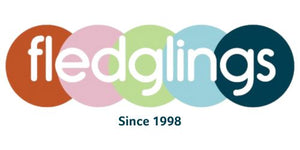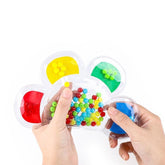Trending Now
Popular Products
Desk Buddy - Multi Textured Tactile Chewable Ruler
- £9.99 (£11.99 inc VAT)
- £9.99 (£11.99 inc VAT)
- (-0%)
- Unit price
- / per
Flower Bead Matching Fidget Puzzle
- £8.49 (£10.19 inc VAT)
- £8.49 (£10.19 inc VAT)
- (-0%)
- Unit price
- / per
HiLINE 'Boojiboo' Girls Incontinence Swimsuit (Lilo & Stitch)
- £36.99
- £36.99
- (-0%)
- Unit price
- / per
Need Help?
Email Us
Smearing: Practical Advice & Support
Smearing (also called faecal smearing or scatolia) can be extremely stressful to manage. It may be linked to sensory seeking, anxiety, communication difficulties, toileting challenges (including constipation), boredom, or changes in routine. Small, consistent changes to setup, clothing and routines can reduce incidents and make clean-up easier.
Safety note: If there is pain, constipation/soiling, blood, or sudden changes in bowel habits, speak to your GP, continence service or paediatric team. Rule out medical causes first.
Who this can help
- Children and young people who smear during or after toileting, at night, or during unstructured time
- Those who seek strong tactile input (liking messy textures) or find wiping difficult
- Families and schools looking for practical, respectful strategies that protect dignity and hygiene
Quick wins
- Create a simple, repeatable toileting routine: same bathroom, same steps, same prompts.
- Reduce access during high-risk times: use back-zip sleepwear or well-fitting bodysuits; plan quick checks after the toilet.
- Offer an alternative texture: have a safe “messy” option (e.g. fidget putty) for hands during transitions.
- Make clean-up fast: keep wipes, bags and spare clothing in a labelled grab-kit by the bathroom/bedroom.
- One change at a time: introduce, practise, praise. Consistency beats big overhauls.
Practical strategies
1) Medical & comfort first
- Check for constipation or discomfort (with your clinician). Addressing pain often reduces incidents.
- Use soft toilet paper or moist wipes if advised; teach gentle wiping with clear steps.
2) Clothing & access
- Night-time: all-in-one sleepwear with back zip can reduce access while remaining comfortable.
- Daytime: well-fitting bodysuits with poppers can help keep nappies/pads secure and reduce hand access.
- Layers: dungarees/one-piece outfits and higher-waist leggings can make access less immediate.
- Always prioritise comfort and dignity; check for pressure marks and allow easy changes when needed.
3) Routine & visuals
- Use a simple visual sequence for toilet steps (e.g. “toilet → wipe → flush → wash → dry”).
- Set timers for post-toilet checks (e.g. 5–10 minutes after) to catch and clean quickly.
- Build in a preferred activity immediately after toileting to encourage quick transitions away from the bathroom/bedroom.
4) Sensory alternatives
- Offer safe tactile input at typical smear times: therapy putty, zip bracelets, textured fidgets.
- Keep hands “busy” during waits (bath running, bedtime wind-down) to reduce idle touching.
5) Environment & clean-up
- Store tempting items out of sight; use closed lidded bins and keep cleaning kit in one labelled box.
- Protect bedding and mattresses to make clean-up faster and reduce laundry stress.
- Use neutral, non-judgemental language. Praise any step in the right direction.
Products that can help
Start with these ranges, then pick items that fit age, setting and budget. (Examples are optional and may change with stock.)
- Bodysuits & popper vests – help keep nappies/pads secure and reduce access
- Back-zip sleepsuits & all-in-ones – reduce access at night while maintaining comfort
-
Beds & bedding protection – waterproof mattress covers, duvet/pillow protectors, washable bed pads
- Example: Washable Bed Pad
- Example: Waterproof Mattress/Protector (see full range in Beds & Bedding)
- Fidgets & hand-busy tools – safe alternatives for tactile input (e.g. zips, rolls, squeezes)
- Smearing aids – curated picks for routines, visual supports, clothing and clean-up
Tips for success
- Practise the wiping routine when calm (not in the middle of an incident).
- Have two identical sets of pyjamas and bedding to make swaps quick at night.
- Use calm prompts and specific praise (e.g. “Great washing hands!”).
- Review fit regularly: too-loose nappies/pads can leak and lead to touching.
Troubleshooting
- New or worsening smearing: check for constipation, tummy pain, skin irritation or recent changes to diet/meds; contact your clinician.
- Night-time only: consider back-zip sleepwear and mattress protection; add a brief check before you go to bed.
- Right after toileting: add a post-toilet timer and preferred activity; supervise wiping until the routine is fluent.
- Seeks messy textures: offer an acceptable “messy” option at set times (putty/foam play) and build handwashing into the activity.
Funding & budgets
- Potential funding options for families
- Digital catalogues to compare options by category
Need advice?
Email enquiries@fledglings.org.uk with age, setting (home/school), when smearing tends to happen and what you’ve tried. We’ll suggest options that fit your budget. We accept Purchase Orders. UK delivery from £4.99.
Support our work
Donate to Fledglings to help us keep advice free and prices fair.
Related
- Toilet Training: Practical Advice
- Smearing: Practical Advice
- Mealtimes: Practical Advice
- Help & Support (overview)
Last reviewed: 12 September 2025
- Choosing a selection results in a full page refresh.






